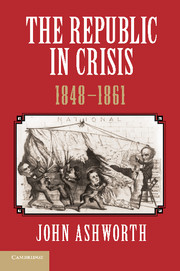Book contents
- Frontmatter
- Contents
- List of Maps and Cartoons
- Chronology of Events
- Introduction
- 1 The United States in 1848
- 2 Crisis at Mid-century, 1848–1851
- 3 Immigrants, Alcoholics and Their Enemies
- 4 Preparing for Disaster
- 5 Political Maelstrom, 1854–1856
- 6 North and South, Republican and Democrat
- 7 Political Polarisation, 1857–1860
- 8 Secession and the Outbreak of War, 1860–1861
- 9 Conclusion
- INDEX
- References
2 - Crisis at Mid-century, 1848–1851
Published online by Cambridge University Press: 05 September 2012
- Frontmatter
- Contents
- List of Maps and Cartoons
- Chronology of Events
- Introduction
- 1 The United States in 1848
- 2 Crisis at Mid-century, 1848–1851
- 3 Immigrants, Alcoholics and Their Enemies
- 4 Preparing for Disaster
- 5 Political Maelstrom, 1854–1856
- 6 North and South, Republican and Democrat
- 7 Political Polarisation, 1857–1860
- 8 Secession and the Outbreak of War, 1860–1861
- 9 Conclusion
- INDEX
- References
Summary
Eighteen forty eight was a presidential election year. Despite the controversy over slavery, recently reignited by the Wilmot Proviso, the two major political parties, Democrats and Whigs, were not, or at least did not wish to be, primarily concerned with the issue in any of its forms. At the start of 1848 each party was able to recruit and win elections in all sections of the Union, with neither of them officially committed either for or against slavery. Each maintained a kind of neutrality on the issue. But this neutrality was highly precarious.
The Democrats had come into formal existence in the 1820s as the party which placed Andrew Jackson in the White House. Nevertheless they could legitimately trace their origins back to the 1790s when Thomas Jefferson, whom they almost universally revered as their patron saint, had battled the Federalists. Jefferson’s party had been known as Republican, but its creed was very similar to that with which Democrats were identified from the 1820s and 1830s. Equally there were clear continuities (as well as discontinuities) between the policies adopted and the attitudes taken by their opponents, the Federalists, in the 1790s and the Whigs in the 1830s, 1840s and 1850s. In short the first party system (as scholars term it) of the 1790s was, in some important respects, a rehearsal for the second, which came into existence with the creation of the Whig party in 1833–1834 and which would last into the mid-1850s. Historians have debated the political functions of the second party system and many have noted the degree to which national party organisations served to mediate sectional tensions and keep the country together.
- Type
- Chapter
- Information
- The Republic in Crisis, 1848–1861 , pp. 30 - 64Publisher: Cambridge University PressPrint publication year: 2012



